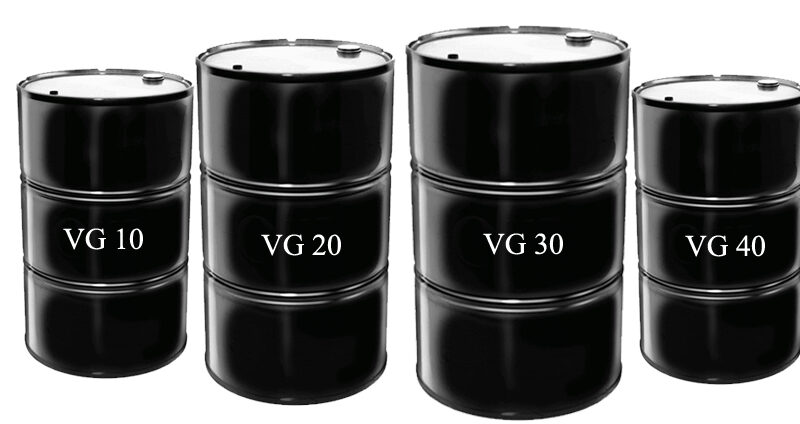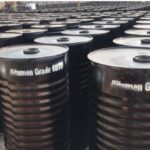
Importance of Viscosity Grade Bitumen in Industry – Uses, Advantages, and Insights
Viscosity Grade (VG) Bitumen is a critical component in modern infrastructure, particularly in road construction, waterproofing, and industrial applications. Unlike older grading systems like Penetration Grade, VG Bitumen offers precise viscosity-based classification, helping engineers select the right binder for specific climates, traffic loads, and performance expectations.
In this post delves into what importance of viscosity grade bitumen in industry? we explore the types, manufacturing process, key specifications, industrial uses, advantages, comparison with other bitumen grades, and answer common questions, with a focus on Peak Universal Business as a reliable supplier.
What is Viscosity Grade Bitumen?
Viscosity Grade Bitumen is a classification of bitumen based on its viscosity measured at two standard temperatures: 60°C (absolute viscosity) and 135°C (kinematic viscosity). These metrics ensure consistent performance during paving operations and under real-life traffic and environmental conditions.
The main VG grades include:
-
VG-10 – Softest, ideal for cold climates and surface dressing
-
VG-20 – Suitable for moderate climates
-
VG-30 – Widely used in road construction
-
VG-40 – Hardest grade, best for heavy traffic and high temperatures
🏭 How is Viscosity Grade Bitumen Manufactured?
The production of Viscosity Grade Bitumen involves several well-controlled stages, ensuring each grade meets strict performance criteria. Below is a step-by-step explanation of the process, enhanced with transition words for better clarity:
-
⚗️ Distillation of Crude Oil
First, crude oil is heated in a distillation column. As a result, it separates into lighter and heavier fractions. The lighter ones are used for fuels, while the heavier components are reserved for bitumen production. -
🔬 Vacuum Distillation
Next, the heavier residues undergo vacuum distillation. This process prevents thermal cracking by operating under reduced pressure. Consequently, it produces vacuum residue, which serves as the raw material for VG Bitumen. -
🧪 Viscosity Adjustment
After vacuum distillation, the base material must be fine-tuned. Through controlled oxidation or blending with fluxes, the bitumen’s viscosity is adjusted. Therefore, the material aligns with the precise flow characteristics required for each VG grade. -
✅ Grading and Quality Control
Finally, the modified bitumen undergoes rigorous testing. This includes measuring viscosity at two temperatures, along with checking flash point, ductility, and solubility. Once it meets the specified values, it is officially graded as VG-10, VG-20, VG-30, or VG-40.
4. ✅ Grading and Quality Control
The bitumen is tested for viscosity, flash point, ductility, and solubility before being labeled VG-10, VG-20, VG-30, or VG-40.
VG bitumen is produced through the distillation of crude oil. The production process involves the following steps:
Distillation: Crude oil is heated in a distillation column to separate lighter fractions from the heavier ones. The heavy fraction, called residue, is then further processed.
Air Blowing: The residue undergoes air blowing, where hot air is passed through it to modify its physical properties, enhancing its viscosity and softening point.
Blending: Different residues are blended to achieve the desired viscosity grade. Additives may also be introduced to improve specific properties.
VG bitumen is widely used in road construction, waterproofing, and various industrial applications due to its favourable properties. Here are some key uses and applications:
🛣️ Road Construction
VG Bitumen is used in hot mix asphalt for flexible pavement layers, binder courses, and surface courses. VG-30 and VG-40 are popular for highways.
🌉 Bridge Deck Waterproofing
VG-10 and VG-20 are often used for sealing bridge decks and expansion joints, offering strong adhesion and flexibility.
🏢 Roofing and Waterproofing
Its resistance to water and flexibility under temperature variations makes VG Bitumen an ideal material for roofs and foundations.
🚛 High-Load Pavement Projects
VG-40 is used in ports, industrial roads, and expressways due to its stiffness and rutting resistance.
🌦️ Climatic Adaptability
Each VG grade is selected based on climatic conditions, helping prevent rutting in hot regions and cracking in cold zones.
✅ Advantages of Using Viscosity Grade Bitumen
VG bitumen offers several advantages over other types of bitumen, making it a preferred choice in many applications:
-
📏 Consistent Performance: Viscosity-based grading ensures predictable behavior in real-world conditions
-
🧱 High Structural Integrity: Suitable for roads subjected to heavy traffic loads
-
🌡️ Thermal Stability: Withstands extreme temperature fluctuations
-
💧 Excellent Waterproofing: Highly resistant to water infiltration
-
🛠️ Low Maintenance: Longer service life reduces repair costs
Disadvantages of Viscosity Grade Bitumen
Despite its many advantages, VG bitumen has some limitations:
Cost: VG bitumen can be more expensive than other types of bitumen due to its specific production process and quality standards.
Temperature Sensitivity: While VG bitumen is stable at high temperatures, it may become too stiff at low temperatures, leading to cracking in cold climates.
Complex Handling: The production and application of VG bitumen require specialized equipment and expertise, which may not be readily available in all regions.
🔍 Comparison: Viscosity Grade vs. Penetration Grade Bitumen
| Feature | Viscosity Grade Bitumen | Penetration Grade Bitumen |
|---|---|---|
| Testing Method | Viscosity @ 60°C & 135°C | Needle Penetration @ 25°C |
| Climate Suitability | Tailored per temperature | Less accurate |
| Performance Under Load | More consistent | Variable |
| Usage Preference | Widely used globally | Older system |
📊 Properties of Viscosity Grade Bitumen
| Grade | Viscosity @60°C (Poise) | Viscosity @135°C (cSt) | Penetration (dmm) | Flash Point (°C) | Solubility (%) |
|---|---|---|---|---|---|
| VG-10 | 800–1200 | ≥250 | 80–100 | ≥220 | ≥99 |
| VG-20 | 1600–2400 | ≥300 | 60–80 | ≥220 | ≥99 |
| VG-30 | 2400–3600 | ≥350 | 50–70 | ≥220 | ≥99 |
| VG-40 | 3200–4000 | ≥400 | 40–60 | ≥220 | ≥99 |
VG bitumen is available in various grades, each with specific properties tailored to different applications:
VG-10
- Viscosity: Low viscosity, making it suitable for cold climates.
- Uses: Ideal for spraying applications, surface dressing, and paving in colder regions.
- Advantages: Easy to work with in low temperatures.
- Disadvantages: Not suitable for high-temperature applications.
VG-20
- Viscosity: Medium viscosity.
- Uses: Suitable for moderate climates, used in paving and road construction.
- Advantages: Balanced performance in various climates.
- Disadvantages: Limited use in extreme temperature conditions.
VG-30
- Viscosity: High viscosity, suitable for hot climates.
- Uses: Ideal for high-traffic roads and highways, hot mix asphalt.
- Advantages: Excellent performance in hot climates, high durability.
- Disadvantages: More challenging to work with in colder temperatures.
VG-40
- Viscosity: Very high viscosity, used in extremely hot climates.
- Uses: Heavy-duty pavements, airfields, and industrial applications.
- Advantages: Superior performance in extreme heat, very high durability.
- Disadvantages: Very stiff in low temperatures, complex handling.
Quality Tests for VG Bitumen
Ensuring the quality of VG bitumen is crucial for its performance in various applications. Some common quality tests include:
- Viscosity Test: Measures the fluidity of bitumen at different temperatures.
- Penetration Test: Assesses the hardness of bitumen by measuring the depth a needle penetrates the sample.
- Softening Point Test: Determines the temperature at which bitumen softens.
- Ductility Test: Measures the bitumen’s ability to stretch without breaking.
- Flash Point Test: Determines the temperature at which bitumen emits vapors that can ignite.
Environmental Considerations
The production and use of VG bitumen have environmental implications. Efforts are being made to minimize the environmental impact through the following measures:
- Recycling: Reclaimed asphalt pavement (RAP) is used to reduce the demand for new bitumen and lower environmental impact.
- Emission Control: Modern production facilities implement emission control technologies to reduce air pollution.
- Sustainable Sourcing: Using crude oil sources that adhere to environmental standards.
Future Prospects
The future of VG bitumen looks promising with advancements in technology and increased focus on sustainability:
- Innovative Additives: Research is being conducted on additives that can enhance the properties of VG bitumen, such as improved temperature performance and reduced environmental impact.
- Green Bitumen: Development of eco-friendly bitumen variants that use sustainable raw materials and have lower carbon footprints.
- Smart Roads: Integration of VG bitumen in smart road technologies that can self-heal and adapt to changing traffic conditions.
Peak Universal Business: As a VG Bitumen Supplier
Peak Universal Business is a leading supplier of VG bitumen, offering high-quality products that meet industry standards. Their expertise in sourcing, production, and distribution ensures that clients receive reliable and consistent VG bitumen for their projects. Whether for road construction, industrial applications, or waterproofing, Peak Universal Business provides tailored solutions to meet specific needs.
❓ FAQs about Importance of Viscosity Grade Bitumen in Industry
📌 What is the difference between Viscosity Grade and Penetration Grade Bitumen?
Viscosity Grade is based on how the bitumen flows at certain temperatures, making it more reliable for road performance. Penetration Grade is based on needle penetration at 25°C, which doesn’t reflect real-world conditions.
🛣️ Which Viscosity Grade Bitumen is best for highways?
VG-30 is commonly used for national highways and dense bituminous macadam layers. For heavy industrial roads or tropical climates, VG-40 is preferred.
💧 Can VG Bitumen be used for waterproofing applications?
Yes, VG Bitumen is excellent for waterproofing roofs, basements, and concrete structures due to its adhesion and water resistance.
🌡️ Is VG Bitumen suitable for hot climate zones?
Definitely. VG-40 is ideal for areas with high ambient temperatures because of its resistance to softening and rutting.
🧪 How is the viscosity of bitumen tested in the lab?
Engineers use viscometers to measure absolute viscosity at 60°C and kinematic viscosity at 135°C to ensure compliance with VG standards.
🧾 Conclusion- Importance of Viscosity Grade Bitumen in Industry
Viscosity Grade Bitumen has transformed the way engineers approach road construction, waterproofing, and infrastructure development. With well-defined performance metrics and superior thermal resistance, VG Bitumen offers durability, flexibility, and cost-effectiveness across a wide range of industrial applications. Its graded approach ensures project-specific optimization—making it the modern industry standard for bituminous materials.
With a reliable supplier like Peak Universal Business, clients can be assured of the quality and performance of VG bitumen for their projects.
📣Call to Peak Universal Business
📞 Need high-performance Viscosity Grade Bitumen for your next project?
📌 We in Peak Universal Business, offer:
-
🛢️ VG-10, VG-20, VG-30, and VG-40 in drums or bulk
-
📄 TDS and MSDS documents
-
🏗️ Technical support for paving and industrial projects
🔹 Request a Quote | 🔹 Download TDS | 🔹 Talk to a Bitumen Specialist
📧 Email: [email protected]
📞 Phone: +971 4 878 2031
🌐 Visit: PUBLtd. VG Bitumens
If You have any other Query or Question you want to ask, Please don’t hesitate to Contact Us.
- 0 comment





Leave a Reply